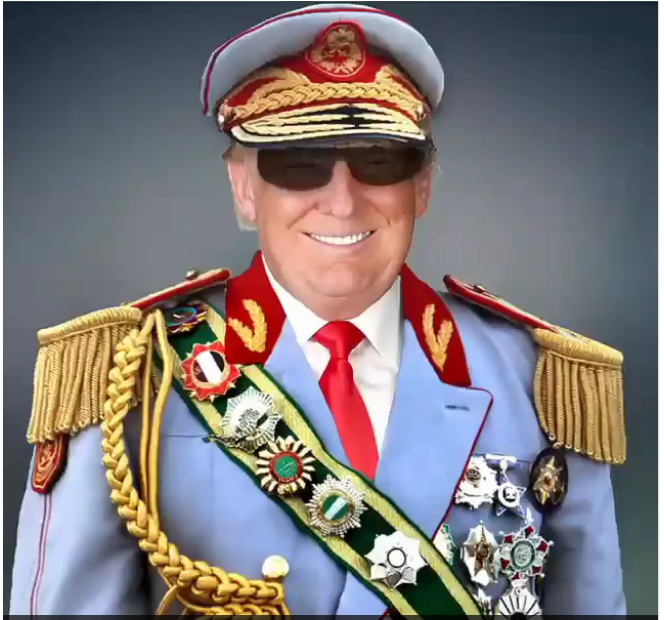If the FBI Raid Shows the U.S. Becoming a Banana Republic, It’s Trump’s Banana Republic
Try as we might to ignore Donald Trump’s wrestling with the Justice Department over apparently illegal removal and possession of classified documents at his palatial Mar-a-Lago home, neither the former president nor the courts will let us go more than a day or so without feeling new insults about it all.
At this point, according to government emails and reporting by journalists, we’ve seen the sheer volume of taboo material grow into a substantial mound topping 1,000 classified documents, including those specifically reported to be those from the CIA and other security agencies. Whatever else, this was a substantial haul of documents that are not legally allowed outside of protected government facilities.
We’ve learned that Trump, his lawyers and aides at various levels either consistently lied or demurred about returning requested – and subpoenaed – documents back to the National Archives. Indeed, we even saw one federal judge whom Trump had appointed lecture Trump’s lawyers on how to write, present and serve notice of a legal challenge.
Trump was holding hundreds of documents that he had gone through them personally and repeatedly resisted turning them over to the government.
We’ve seen Trump’s challenges to FBI search warrants to both the government’s most polite and most intrusive requests for recovery of documents fail repeatedly and keep swapping excuses. And we’ve seen The Former Guy seeking to take political advantage by turning the entire affair and its various legal or victim-like tendrils into distasteful fund-raising and partisanship.
Even as the Florida federal judge is to rule on the possible, if heavily redacted, release of details of a supporting Justice Department affidavit to obtain the search warrant executed by the FBI, we’ve seen partisanship turn an already tawdry event into an absolutely ugly mess.
As The New York Times reports, Trump stripped of executive privilege on several fronts seems legally unmoored and us resorting to political claims of victimhood at the hands of prosecutors.
Lost in the Political Mist
Seemingly lost in the Trump efforts to paint the government – his own government – as a persecuting force is a fact that Trump has held onto stolen classified documents. It’s an irony beyond easy dismissal since it was Hillary Clinton’s mistaken laptop with maybe a dozen classified documents that had finally propelled Trump’s narrow electoral win in 2016.
He wanted her locked up then, but now sees all government documents as “mine” to use as he sees fit. So much for law and order.
Amid all the ballyhooing among Republican leadership about the FBI being overtly political are the realities that Trump was holding hundreds of documents that he had gone through personally and repeatedly resisted turning over to the government.
Even his new demand for a “special master” to review what seized documents were his own, like his passport (which was returned immediately), is silly. The National Archives is itself just such a “special master.” And the Justice Department on its own had already set up a group of uninvolved department lawyers to do what Trump had requested.
Right-leaning media have jumped on a mention that a White House counsel had signed away any executive privilege claims on behalf of the National Archives as proof that Joe Biden was involved in approving the FBI “raid” at Mar-a-Lago despite Biden’s assertion that he knew nothing of the search warrant execution beforehand.
The emails and actions cited make the case against Trump stronger by underscoring his intention to remove government documents to store at home for his personal use.
Seeing a ‘Banana Republic’
Trump and his circle, then, have come to demean the effort to recover stolen classified documents and refusal to return them at least three times even under subpoena – necessitating the FBI, as the efforts worthy of a “banana republic.” There were tweets to that effect from Florida Gov. Ron DeSantis and former House Speaker Newt Gingrich, for example.
In that light, it was interesting to happen upon a political science study summarized in Politico that looked at “banana republic” prosecutions against former leaders as compared with other global democracies.
“It’s true that few American presidents have found themselves on the wrong side of the criminal justice system. . . but plenty of other countries have arrested, indicted, or imprisoned their current or former leaders, and it’s not a mark against their health as a democracy. Quite the contrary,” an academic study of 243 cases from 1972 through 2021 shows.
“The evidence shows that free countries — those that have strong records of protecting political rights and civil liberties — are just as likely to hold their current and former leaders accountable as unfree countries. In fact, such moves are slightly more likely to make countries freer than less free, as well as enable free countries to keep their republic intact.”
John A. Tures, professor of political science at LaGrange College in Georgia, looked at Freedom House data to see if the country was considered free, partly free or not free at the time of the arrest, indictment and imprisonment. Among developed countries, the study looked at prosecutions of sitting or former leaders in Colombia, France, Ireland, Israel, Italy, Mexico and Portugal. Just yesterday, a federal prosecutor in Argentina said he is seeking a jail sentence for fraud involving former president and current vice president Christina Fernandez Kirschner.
In short, what we should be focused on here is whether there was a crime, not on the alternative world of victimhood of a partisan former president.




